Katyn and WWII Diary – November 1939 to August 1942
Leon Gladun, Polish Officer
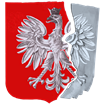
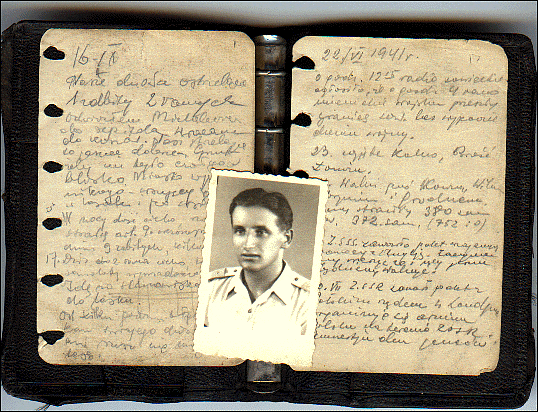
The Katyn Diary of Leon Gladun survived numerous encounters with death, both German and Russian. It chronicles battles in several campaigns and records the writer's travels through many countries on four continents. Though Leon died in 1973, the material in his diary is being used as evidence by the Commission for the Investigation of Crimes against the Polish Nation, in Warsaw. (Photo of Leon taken in Palestine).

Kosielsk was a former monastery.
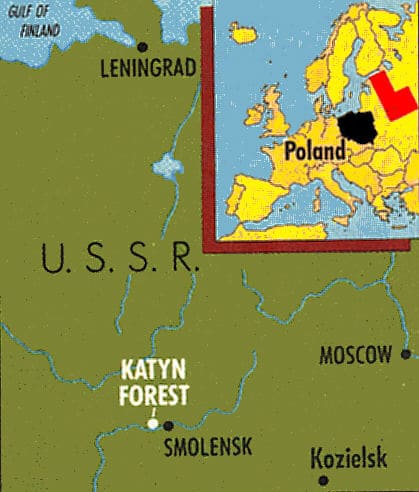
Sept 1st, 1939 - The Nazi's Invade Poland
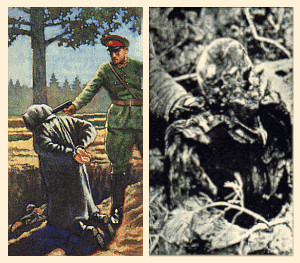
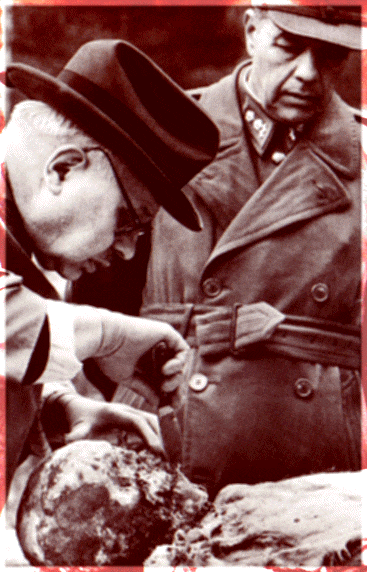
Forensic expert inspects a corpse exhumed from Katyn
Kozielsk Camp/Katyn Excecutions
November 1 – We departed for Kozielsk. The camp here is […].
November 2 – We arrived on site. We were taken to the baths, given blankets and mattresses–and finally we were able to sleep like humans.
November 12 – I’ve been in this camp for two weeks now. There’s several thousand of us here. The conditions are much better, the food more plentiful. We have our own cell–only Officer Cadets. From time to time they take us out for work, other than that it’s quite liveable–sometimes even merry as hell. We play Oko [blackjack] through the night, sleep, eat–we’ll manage to work things out. It’s quite the life, we even have movies here.
December 25 – Jozwa got a letter. Everything’s fine, they know about us at home. Supposedly we’re leaving in a few days. Today a lot of news from home, simply fabulous.
1940 – Transports to Unknown Destinations
April 03 – We’ve spent Christmas and Easter here. From the 3rd of
April the transports began departing. [Transports go to execution and burial sites in Katyn Forest–the Poles assume they are being released or exchanged.]
May 12 – I left finally on May 12. We’re heading for Smolensk. After that who knows? There’s different opinions–that we’re going home or else to the neutral states. It seems that’s wishful thinking as it looks like it’ll be another camp, but going home can’t be counted out. [Leon was taken on the very last shipment from Kozielsk of 90 men which was diverted from execution; 242 were spared out of 4,400. In total 27,000 Polish Allied POWs were executed on Stalin’s orders from camps at Kozielsk, Starobielsk, Ostaskhov.]
May 13 – We arrive in Pawlishtchev Bor, 80 kms from Kozielsk. Another camp here. We stay in Pawlishtchev Bor for exactly a month. It must be said that the conditions here were the best: 3 meals a day and in a dining hall. There was about 380 of us–80 of whom were officer cadets.
June 13 – Suddenly we leave–nobody knows where to.
June 15 – We’re standing at the station in Gryazovets. It seems we’ll be heading further north. We’re sitting in prison wagons behind bars and waiting–we’re getting angry as this trip is damn hard. In view of the present situation at the front–the Germans are near Paris–it’s unknown when we’ll be able to see home.
1941 – Camp Gryazovets (250 miles north of Moscow)
June 22 – At 12:15 p.m. Soviet radio announced that German armies had crossed the Soviet border at 4 in the morning without a declaration of war.
June 23 – Kolno, Lomza, Briest have been taken.
June 24 – Battles at Kowno, Wilno, Kobrin and Grodno. The Germans have lost 380,000 men, the Soviets 372,000–752,000 casualties in total. The USSR has negotiated a mutual assistance pact with England. We’re starting to believe that we too may yet fight!
July 30 – The USSR has negotiated a pact with the Polish Government-in-Exile in London. A Polish Army is being organized on the territory of the USSR. An amnesty for Polish prisoners.
August 25 – The head of the commission for Polish mobilization arrived. Then that afternoon General Anders and General Bohusz-Szyszko arrived and gave speeches. The recruiting work began from that day with the commission conducting registrations, medical exams etc. We’re to leave on September 2 according to the agreement. The areas for our organization are in the regions
of Saratov and Orenburg.
September 2 – Finally we left camp for the rail station. Several hours of rain completely soaked us. At 3 in the morning we departed. We travelled for a whole week by railway transport.
September 9 – We arrived at a camp near Saratov.
1942 – Anders Army in the USSR
July 25 – We’re to travel to Persia and then further on. We’re awaiting this moment like salvation–maybe a couple of more weeks and we’ll no longer be in this “paradise.” Already a year has passed since our army was formed. After a 5-month stay in Tostkoye where we survived the worst winter ever of -50 Centigrade, we left for Uzbekhistan in February of 1942. Here we became reacquainted with heat of 60 Centigrade. But at least we had fruit such as melons, grapes etc.
August 19 – Finally the long-awaited moment arrived and we set off for the port of Krasnovodsk on the Caspian Sea. It was tight in the rail cars but everyone was happy–at last we were leaving “paradise.” We sit in Krasnovodsk for a couple of days and then are loaded aboard the ship. [Some 77,000 Polish ex-POWs and exiles formed a Polish Army in the USSR. Evacuated to Iran they will be equipped by the British, and as the Polish 2nd Corps will fight in the Middle East and Italy.]
August 25 – We set off for Persia by boat. For a few hours we could still see the skyline of Krasnovodsk, and then the last traces disappear over the horizon–and nothing but the sea, The next day we can already make out the shores of Persia. Sure enough toward evening we arrive at the port of Pahlevi. The impression is overwhelming. A beautiful port, green grass, villas–a completely different world. Rain greets us, which we haven’t seen for several months.
Christopher Jacek Gladun was born in 1951 and grew up in Canada to where his family emigrated from England as displaced persons. Sadly, Chris died in Toronto in March 2003. He held a diploma in Journalism from the Niagara College and a BA in Polish Language & Literature from the University of Toronto. Chris also acted as interviewer and researcher for the documentary film “Rescued From Death in Siberia”.
This content is now maintained by the Kresy-Siberia Group, which Chris was a charter member of and which is taking his website and his research work forward.